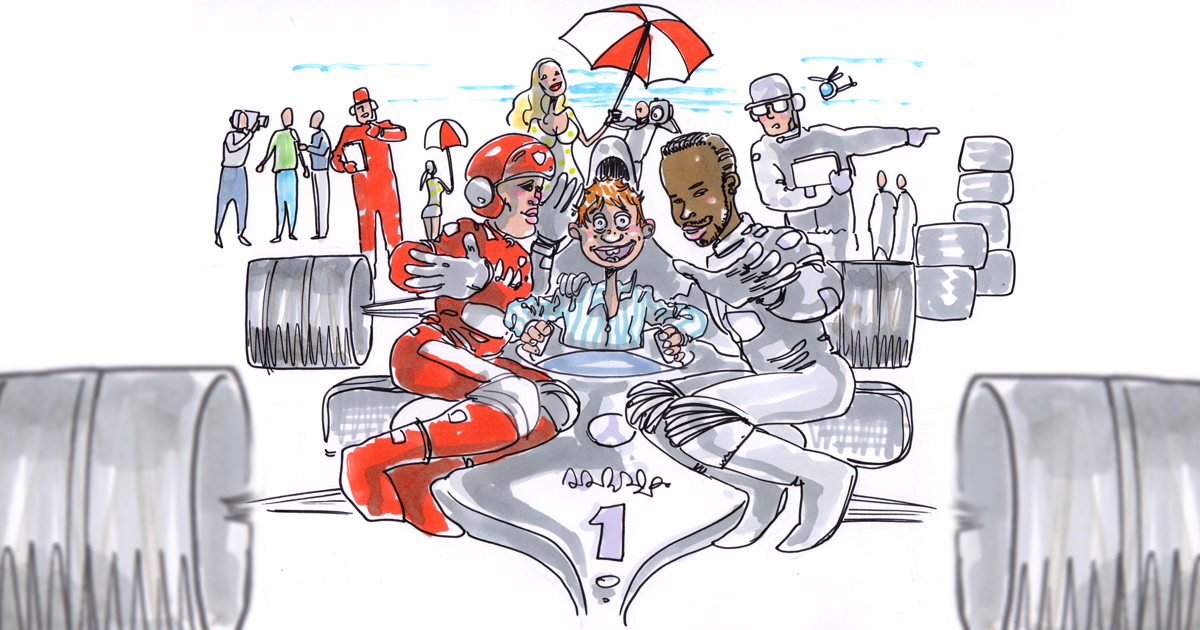One of the huge challenges for any content creator is the tsunami of available “copy” out there for free. Good content. Gratis.
It’s bloody hard to compete with “free”
Incidentally, this exactly was the dilemma facing my splendid podcast co-host, Grant Williams, in founding his SVOD financial media company Real Vision. “don’t do it, there is so much out there of real quality that costs nothing.”
Grant Williams, with Damian and Raoul, ignored that, and believed totally in their quality of content: high end, niche, exclusive. It worked. They have become a paradigm shift in the provision of exceptional financial economic and geopolitical insight.
Grant also produces his own subscription newsletter, ttmygh.com, whose format I’m now going to shamelessly copy for this article. (Anyone not subscribing to Grant is missing a trick. Ask Eddie Pepperell!)
Btw, a more interesting golfer you will not meet.
Grant’s talent in his newsletter is that he performs the role of the curator, the editor. And only then, he does his magic of incredible insights, on top. This will become a “thing”, as the pendulum eventually swings the other way on unbundling. We don’t and won’t have the time or inclination to manage 20 direct OTT subs, and we’ll want a service of personalised curation of best bits. This is going to be a good business. Probably machine learning.
So I’m going to make use of that free – but great – writing and insight out there, to comment on 2 massive themes for the sports industry, that attract me specifically: the intersection between content/rights and big finance with money to invest.
THE STEAMROLLER OF FINANCE
IN SPORT
Sport, until recently, has been immune to the steamroller of finance. But no longer.
Let’s start in La-La land. How many noticed the Hollywood writers strike? Beautifully explained here.
Big finance pushing for consolidation, to create a monopoly position for higher financial “rents”. That’s how the textbooks would describe it. For me the more interesting aspect is that old chestnut of mine: “the bundled product”. Look in this article at how that now works for writing talent, as it has for content and rights.
But note the takeaway: “the whole mess will probably end up in court…. it does resemble the plight of so many other industries, when private equity decides to enter. Workers end up suffering with lower wages and more insecurity while the top managers make out like bandits. The combination of consolidation of the talent agent industry with the desire for Wall Street–sized profits and the entry of Wall Street investors has divorced whatever logic undergirded the writer-agent relationship.”
I find the whole article a bit Trotskyist in its tone, but the point is very well made, private equity and creative talent in music, film – and now sport – are very very uneasy bedfellows.
“While the agents have the guys with billions in capital and Manhattan penthouse apartments on their side, they’ll never have the major bargaining chip at writers’ disposal: scripts, stories, and ideas on paper. It’s one thing for private equity to pillage a non-union business like retail. But Hollywood has long been a labor town, and if the writers stick together, they will show how solidarity can transcend the power of big money.”
Beautifully put.
THE MAGIC AGE OF
AUTHENTIC STORIES
Indeed, we have formally entered the age of the “story”, and those that can do it well with joined up thinking, will win. And then hold all the cards.
Or will they? Private equity are very very smart guys. They will try and also control the source; the content, the rights. They’ve started.
Let’s look at sport. And specifically CVC and Liberty.
CVC is now circling rugby like at the little Big Horn. They are not messing about. No one is clear about what the sport will do with the fresh capital; but I’m sure CVC is very clear how to squeeze out a juicy ROI. My own personal focus (for profit) will be on the losers. The south hemisphere federations and clubs will need a solution. That’s a story to watch.
But these folks won’t stop at rugby. Sport is now in their sights, especially premium sport like football, which is now, via FFP, getting the predictability of cashflows into acceptable shape for a financial investor. Who do we think will finance the Super League?
Folks, it’s coming.
I’m hearing too many Chinese whispers from unrelated sources to still remain in denial.
Hands up those now checking back to that previous quote from the Hollywood writers…..
“the desire for Wall Street–sized profits and the entry of Wall Street investors has divorced whatever logic undergirded the writer-agent relationship.”
…..switch a few words and think of the challenges of Manchester United. The Glazers and Woodward have seemed totally tone deaf to the needs of a sporting cultural beast like United. Same as Hollywood. Managing the “creative industries” is really tough, and we will see much more of this.
BALANCE WITH SPORT AND BIG FINANCE IS ELUSIVE
Let’s check on sport’s other public flirt with big money. F1 is now stepping out with Liberty Media, after its snog behind the paddocks with CVC (them again).
John Malone has always taken full advantage of debt financed growth. So let’s call Liberty very much a finance and cashflow-focussed company.
Now, I’ve been very impressed by a lot of what I’ve seen under the new Chase Carey management. I use, as a best-in-class benchmark, the way they have approached fan segmentation, and the docu-series “Drive to Survive” was truly a wonderfully effective piece of entertainment and promotion.
But how is F1 actually doing with Liberty? One remembers Mr Carey claiming it was “easy” to generate fresh revenues after Bernie.
Doesn’t listen to this author. Ask Mr Geri Halliwell of Red Bull.
Horner doesn’t pull any punches, questioning the company’s attempt to use a US-based approach to F1.
“There is that constant comparison of American sport and franchises versus Formula One,” he said. “American sport works in America and it doesn’t work globally. Formula One has a different appeal. It is one of the biggest sports in the world and you can’t just apply a US-sports approach to something that has been established for 60 or 70 years as a global world championship.”
There you have it. Fans of Arsenal, Milan, Roma, et al, I know are nodding.
I’ll add in that none of the teams is currently signed beyond 2021; 8 circuits are out of contract in the next 12 months, and that F1TV is very challenged.
So, no, Mr Carey, it’s not “easy”. It’s actually very hard, and we have had some of the very best sports leaders anywhere, in Europe. Their EQ honed by the balancing act of growth, whilst protecting traditions. Our American and Asian mates don’t seem to get that, in my 35 year experience. Europe is a special place.
But big finance isn’t all bad. Or bad news. It’s actually great news that sport is now seen as “investable”. Eg Let’s remember how much the bulge banks have helped build all the amazing infrastructure with “American style financing”.
EQ LEADERSHIP WILL BE THE WINNER
The trick will be finding EQ leadership in the sports industry. People who understand EVA as well as WBA, and “feel” the sport.
But even these CEOs of the future better swot up on what fans really want. (What they really really want…..Sorry Christian.)
What fans? Who are they?
Which brings us back to those stories and character development. Because that is what it is. Value will come from a newer generation believing in heroes. Like Tony Stark. Or Arya Stark. And being able to identify with them.
Like say, taking 5 girls who couldn’t really sing, weren’t Victoria Secrets candidates, giving them approachable names and watching them capture every young girl in the world. Ask your wife about that little adventure, Christian. Genius from Virgin Music and Simon Fuller.
The Geri jokes are for a purpose. (Forgive me Christian). To say, imho, that this is where sport needs to go. Stories, and character development. The time is right.
TRANSMEDIA: THE NEW WORD IN SPORTS CONTENT
Indeed, what a wonderful article from the Sports Innovation Lab introducing us to a new word, Transmedia, and telling us very clearly where sport needs to go to compete with the Avengers and GoT.
“The entertainment industry has been designing transmedia properties for a while, but the event-driven sports industry has been slow to take hold of the principles, perhaps because of the sense of security that has developed from a continuously growing live entertainment. But as we enter a new age of sports, fan expectations for how they engage with their media will continue to change, and the sports industry will need to take lessons from other media properties that are successfully employing transmedia strategies.”
Not convinced? Sport isn’t Fortnite?
Have a look at what the luvvies are doing! They get it.
“The experience of telling a story has always been through the best technology there is, which is the live actor. What’s important to us is how these new technologies add to that performance, take the storytelling further, give new options for directors and designers, allow us to shape, refine and redefine the experiences for our audiences is key.”
“What we’ve found with mixed reality is that it offers a shared experience whilst having a digital world presented to you through the technology. This indeed allows us to think about the real world and the digital world simultaneously and bring those realities together. We’ve found audiences focus on the performance but also look at each other through the device and enjoy that collective and connected experience.”
Sport must adapt, and quickly. The design of new digital worlds will become a core competence. Sport Innovation Lab again.
DIGITAL VIEWING EXPERIENCES
NEED TO BE PERSONAL
Companies like Myreze, and SmartSportz, are truly pushing the envelope for what is currently possible. Just make sure the experience is personal. It’s a global world, full of empowered individuals.
Our friends at SportsProMedia.
“In order to think big, media rights holders may next have to think small – individual people small. If you combine the globalisation of sports with life on the go and personal preferences, leagues and rights holders are going to have to appeal to the individual sports fan in new ways.”
Let’s be honest. The convergence is total.
One of the best examples of sports EQ comes from Peter Moore. He knows.
“The next generation [of fans] is going to be playing Fortnite, or Apex Legends, and is he even going to get out of his bedroom? That is the challenge we face. The only way to meet that challenge is go and get them. I am loath to say go into the bedroom and find them, but you have to. You’ve got to talk to them like they are used to being spoken to.”
How they are used to being spoken to.
WHAT ABOUT E-SPORTS?
Epic Games’ Unreal Engine is the hottest thing in sport in my opinion. It powers ESports. And big money likes ESports. I wonder why.
A 2018 Goldman Sachs report stated that esports have landed venture capital investment, totaling $3.3 billion since 2013, and $1.4 billion as of the middle of last year.“We [the esports industry] look like the NBA did in late 60s, early 70s”.
The next 5 years in sports will change in every single way. Be ready to adapt.
Be bold, stay hungry.
Or be a victim of Darwin.
—————————————-
To see another Albachiara angle on sports biz polarisation:
https://albachiara.net/placing-sports-bets-in-vegas/
To know more about how we lead change management and knowledge transfer in the digital age:
https://albachiara.net/what-we-do/
To get to know our story:
https://albachiara.net/the-albachiara-story



